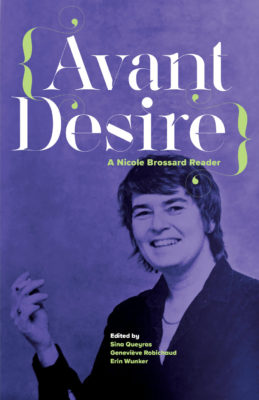The publication of Avant Desire: A Nicole Brossard Reader is a happy occasion to be sure, but it does beg some questions. Notably: “What took so long?” Brossard’s career spans five decades, after all, and though compilations of her work have appeared, there hasn’t been a collection with the ambition demonstrated by Avant Desire before now. This is surprising given the richness and daring of Brossard’s work across literary genres: fiction, poetry, essays, and hybrid forms. Moreover, the work has great significance for a variety of readerships and communities: Brossard is a key figure in Quebec, Canadian, feminist, LGBTQ+, and experimental literatures, to name just a few.
The collection’s editors have deftly corrected this lack and addressed the oeuvre’s diversity by assembling a substantial selection of Brossard’s writing in translation (including pieces previously hard to find or unpublished in English) and arranging it in thematic sections titled “Desirings,” “Generations,” “The City,” “Translations, Retranslations, Transcollaborations” and “Futures,” a range of titles that on its own demonstrates the book’s comprehensiveness. One reward of this organizational model, which diverges from more traditional chronological approaches to anthologizing, is the chance to see how a theme is taken up by the author and developed in different genres or related texts, adding texture and depth to the reading. For example, one might encounter this:
i am telling you about my passion for reading you hidden behind these quotations, the facts are such that your project of the text and the text of the project are completed in the taste of the words, in the taste of the kiss. (from Lovhers)
A few moments later, one could come across this:
in the plupresent of fear and ecstasy
in the simple present of our intelligent tissues (from “Ultrasound”)
Avant Desire Coach House Books
A Nicole Brossard Reader
Edited by Sina Queyras, Geneviève Robichaud, and Erin Wunker
$26.95
paper
320pp
9781552454039
Now to put her tongue in the other’s mouth. Her desire in the city and geography. The other’s house / garden path.
And this from near the very end of the piece:
Such a kiss it will have been that neither the desire nor the saliva could have been more meticulously, tremblingly strewn inside your mouth, wherein to do the tour, idle round your mouthhole in the lower reaches of the city.
These bring the world, in the form of the urban, into the flow of language and love, too.
Even such short samples point to the scope, continuity, and amplitude of Brossard’s writing and the rigour with which she develops her themes. Such allusiveness is likely to make the anthology generative for everyone: writers, scholars, and general readers alike.
So, Avant Desire is a rich and sophisticatedly curated collection, but the anthology form inevitably invites quibbling. Some Brossard readers will find themselves asking why a particular favourite text isn’t included, but even they will acknowledge that what is in the book is powerful. And of course, the downplaying of chronology in Avant Desire, while heightening the presence of theme, does make it more difficult to get a sense of how such ideas develop over time, rather than across genre or project. Still, quibbles aside, Avant Desire: A Nicole Brossard Reader is a vital read, edifying and enchanting all at once.mRb






0 Comments